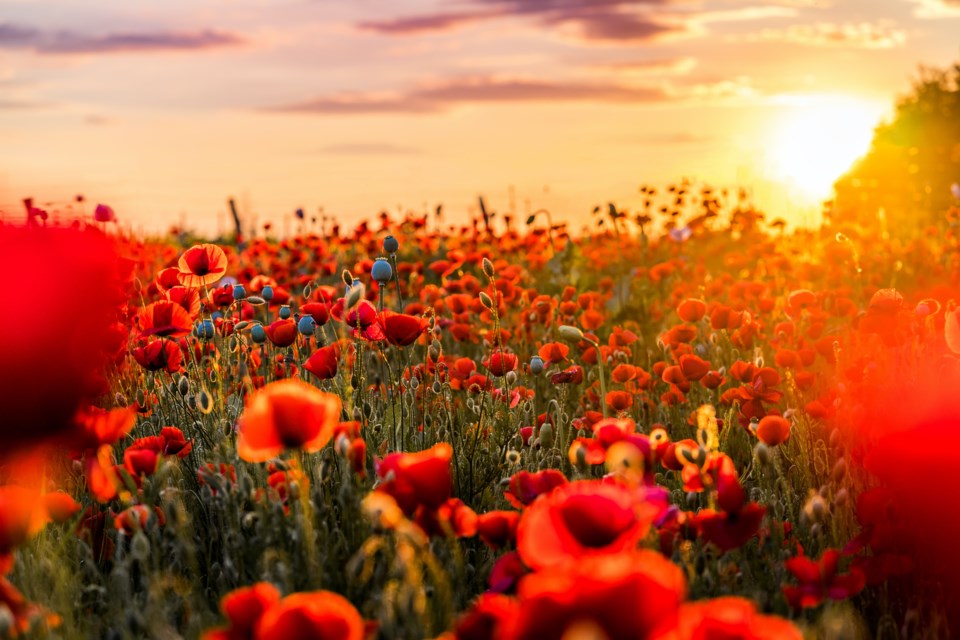I was very young when my mom let me sign up for cadets. She couldn’t afford to have me in sports leagues, but she wanted me to be involved with the community in a way that I could build friendships and skills, to learn, and contribute. I thrived.
I quickly joined the guard and was proud to march on Remembrance Day with my fellow cadets and honour the veterans and fallen soldiers who had fought for our peace and freedom. I have stood sentry on the Memorial Park Cenotaph, ordered arms in salute, marched through the streets of downtown, lain wreaths, and have read almost every name on the wall.
I have ancestors that fought in both world wars and have always shown my respect for the veterans and the Legions that organize the ceremonies.
Remembrance Day ceremonies were solemn moments of mutual respect with everyone in attendance; where hot chocolate, coffee and sandwiches were shared between the veterans, the survivors, the attendees, the homeless, Indigenous peoples, and the youth. Everyone was there to share in the warmth of freedom and peace, and to pay respects to the fallen and the living.
We promised never to forget how close the world came to enduring the inhumanity of totalitarian dictatorships spreading across the globe, fuelled by hate and ignorance, and that ultimately took the lives of tens of millions of innocent people.
I am Anishinaabe-kwe from Wahnapitae First Nation. In our community and with other First Nations, Anishinaabe peoples gather in ceremony for many different reasons. Almost always outside somewhere. We sometimes move plants, medicines, rocks, wood, or soil into sacred positions within our circles to help us connect with the land and our ancestors so we can speak and listen to them through ceremony. For honour and remembrance ceremonies, all are welcome to come and be a part of the ceremony. The air, fire, land, and water are specially invited to participate.
This year, Indigenous people across Canada are trying to cope with the discovery of thousands of unmarked graves at residential schools, the graves of children that never came home, the inhumanity of a colonial Canada that committed genocide against a race of peoples right here on Treaty Land.
Children were the soldiers fighting on the front lines, dying in the trenches, and sacrificing their futures and families. Their only allies were each other, and although their parents tried their best, no one was fighting for them. It was a war that started before Stalin and Hitler were even conceived.
What would be unfamiliar to a fallen soldier or veteran is that those residential school children — who fought for freedom, who tried to fight but couldn’t, those who lost their lives far from home — were not brought home with honour and fanfare, were not treated with respect, were not returned to their families and shown the dignity of a proper ceremony to honour their death.
They were lost but not forgotten.
Colonization, the Indian Act, the residential schools, reservations and other acts of genocide and racism in Canada ultimately contributed to the deaths of tens of millions of Indigenous peoples and has caused immense trauma for millions more. Indeed, “Indian” reservations systems may have inspired the Holocaust (Toland, 1976).
Never could I have imagined that one day, those very same veterans, that I had such profound respect for, would treat the less fortunate, marginalized, racialized, suffering, struggling people — the people just like you and me, that freedom and peace was fought for — with complete disrespect, disregard, and indifference. As though the lives of homeless people were equivalent to the plastic wrappers blowing in the transient breeze that passes through the pine trees along Medina Lane, scooped up and dumped at the landfill.
They are people, they are Canadians, they have ancestors, they have history, they have human rights.
The legions, veterans, the city, and all Canadians should stand by the less fortunate on Remembrance Day (and every day) to help us fight against adversity, racism, intolerance, poverty, addiction, and to fight for equality, tolerance, health and respect.
The homeless are some of today’s soldiers in the trenches, although they are treated as the enemy; they live in similar cold, wet, cramped, unsafe, unhealthy conditions as the soldiers and residential school children, some of the very conditions that the Legion wanted those in attendance next week to experience so they might empathize.
From my perspective, the children and the soldiers share the suffering, the sacrifice, and the ongoing fight against inhumanity.
They should share the flagpole.
Please keep them lowered out of respect for everyone: a gesture of solidarity between allied forces.
Why is there such disdain from the legions of veterans for the Indigenous and the homeless? The veterans fought for everyone’s freedom, not just the wealthy, the healthy, and the white: they fought for each and every one of us.
I am relieved that the City of Greater Sudbury, however truthful their initial intent was, decided against the Royal Canadian Legion’s request to sweep the homeless under the proverbial rug and literally out of their homes.
The veterans could have demanded honourable actions from their Legions: they could have made a space for the homeless to participate and pay their respects, they could have offered water from their canteens, they could have been an ally.
Instead, they blame it on some permitting issue and point fingers when they should really take a look at their own actions and values.
It would have been inhumane for the city to have cleared the encampment, but the fact that the legion wanted it done, and is still upset that it wasn’t done, will remain — at least for me — a disgraceful and shameful stain on their legacy.
Hannah Burke
Greater Sudbury
